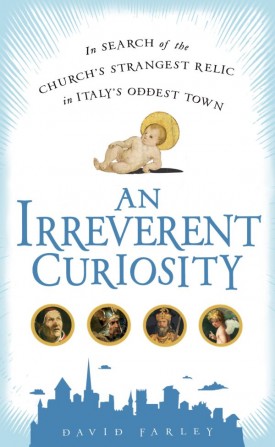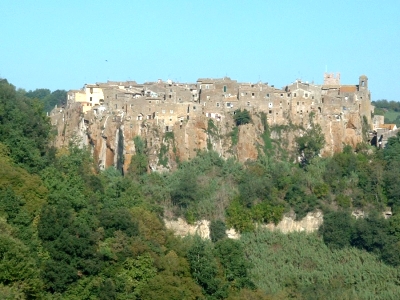Q&A: An Irreverent Interview With David Farley

David Farley’s Quest to Obtain the Carna Vera Sacra — The Foreskin of Christ
By Luke Armstrong
We travel for distinctive reasons. The sun and sand. Adventure. To learn some thing new. To leave one thing previous behind. To conquer fears. To conquer mountains. To study. To drink. To sober up. To knowledge other cultures. To locate the foreskin of Christ?
In David Farley’s lately released guide, An Irreverent Curiosity, that is precisely what took him on a yearlong quest in Calcata, Italy. In advance of it became an excommunicable offense to speak about, this relic was a Church superstar. Early on, it attracted droves of faithful pilgrims, and then, controversy. The controversy finally led to its mysterious disappearance in 1983, or as Farley’s investigation uncovers, was it seriously 1986?
The last recognized resting place of the relic, Calcata, Italy, is where Farley starts his quest for answers to the recent whereabouts of the infamous relic. Regardless of a subject that could easily be a mockery slam-dunk, what the book is not, is irreverent in direction of the relic or its place in Church historical past. It’s as excellent as travel writing gets. A quest. A mystery. A well-researched exposé on eccentric Calcata, Church historical past and Italy that is quick to read and challenging to put down.
If Indiana Jones could create very well (I suspect he can not), this guide is in the vein of what he would be publishing. Intrepid travelers, get notes. Farley’s means to open closed doors abroad is appropriate to any foreigner obtaining disappointment in a far-off land. Following is an interview with Farley about his search for the “Church’s strangest relic in Italy’s oddest town.”
 The Expeditioner: Your guide is not just a travel book, but it is a quest book, detailing your yearlong quest in Italy to discover the holy prepuzio, or in layman’s terms, the holy foreskin of Jesus. How is questing for anything distinct than just merely traveling someplace?
The Expeditioner: Your guide is not just a travel book, but it is a quest book, detailing your yearlong quest in Italy to discover the holy prepuzio, or in layman’s terms, the holy foreskin of Jesus. How is questing for anything distinct than just merely traveling someplace?
Farley: A whole lot of traveling consists of both aimless wandering or checking web pages and experiences off a record, which is not a horrible matter, b ut putting on your own on a quest instantaneously tends to make you aspect of a story with a beginning, middle, and an end, producing a narrative arc and a resolution. Whether or not you pick out to publish about it is a different story. It instills a bit extra significance to one’s travels and takes the traveler to components of the city/nation/spot that they would never consider to take a look at.
The Expeditioner: Your title, An Irreverent Curiosity, produced me presume that your book was not going to be really reverent in the direction of the Church’s remedy of relics. Considering the topic matter — locating Jesus’ lost foreskin — as written by a former Catholic, it would not be hard to consider a mocking, sarcastic tone. Although the Church may possibly not agree, I imagined you wrote relatively and respectfully. At occasions it appears that you treat your quest to uncover the relic with the identical reverence that was proven to it throughout the Middle Ages. Was this usually your intentional when you made the decision to compose about it? Generally, why is your guide respectfully devoid of any penis jokes?
Farley: Thank you for pointing that out. I’ve carried out a good deal of press — radio interviews and Q&A’s online — but just about none of it has been with Christian publications or radio displays. They read through what it’s about and instantly consider I’m making enjoyable. The reality is, I didn’t have to make the apparent puns and jokes about the topic matter. One could see my book, from the to start with to final page, as an implicit dick joke. But that was under no circumstances my intention. I respect historical past and the worldviews of the people that came in advance of us and I desired that to come through in the book. It fascinated me most of all that this relic, once a player in the spiritual landscape of medieval Europe, was now unknown and no longer appreciated.
 The Expeditioner: A single of the points I liked the most about your saga to find . . . okay, I´m just going to say it . . . a preserved part of Jesus´ penis, was the uniqueness of your travel saga. Looking for Jesus’ foreskin is not something that Lonely Planet has on any prime ten record. It’s certainly not a little something I know of everyone else accomplishing. The twenty-1st century is perhaps not the very best century for the pioneering spirit. There are no new lands to uncover, fewer virgin mountains to climb, and simply just less points to find out. Let’s be actual. Who hasn’t summited Everest? Who hasn’t flown solo all over the planet in a hot air balloon (yawn)? Had been you intentionally wanting for a some thing novel to travel for, to quest for, or did the foreskin unintentionally pick your interest?
The Expeditioner: A single of the points I liked the most about your saga to find . . . okay, I´m just going to say it . . . a preserved part of Jesus´ penis, was the uniqueness of your travel saga. Looking for Jesus’ foreskin is not something that Lonely Planet has on any prime ten record. It’s certainly not a little something I know of everyone else accomplishing. The twenty-1st century is perhaps not the very best century for the pioneering spirit. There are no new lands to uncover, fewer virgin mountains to climb, and simply just less points to find out. Let’s be actual. Who hasn’t summited Everest? Who hasn’t flown solo all over the planet in a hot air balloon (yawn)? Had been you intentionally wanting for a some thing novel to travel for, to quest for, or did the foreskin unintentionally pick your interest?
Farley: You imply, it is not on any Lonely Planet lists . . . still. No, in all seriousness, what attracted me to this kind of a bizarre notion was the truth that we are in the twenty-initial century and this long-time facet of western spirituality — relic veneration — is slowly, quietly dying. I’m interested in the history of spirituality but I’m a lot more interested in documenting aspects of world culture that are not surviving modernism. So this was significantly less of a literal exploration than a documenting of a piece of background that has practically been lost to us.
The Expeditioner: Just after reading through your book, I’ve decided that there is not enough “questing” going on nowadays. Do you agree? What can run of the mill travelers do to come to be intrepid questers?
Farley: I agree. I’d get started with figuring out in which your interests lie. Then arrive in a city and let these interests guidebook you. If you’re in Tokyo, place by yourself on a quest to locate, say, the most uncommon sushi or some meals you can not get back property, like fugu (the potentially lethal blow fish). Or just pick some random thing—creepy vintage ventriloquist dummies, for example—and try out to find one. You will finish up in some interesting off-the-radar spots and meeting exciting individuals. In a way, it is a travel enhancer. Cialis for travel.
The Expeditioner: The Vatican surely did not go out of their way to aid you on your quest. Complete dismissal of anything at all to do with you and your mission would seem a fantastic way to describe their presence. Have you acquired any feedback, beneficial or unfavorable, from any one in the Church about your book?
Farley: Like their policy on the Holy Foreskin itself, the Church’s response to my guide has been silence.
 The Expeditioner: Travel author critic Edward Marriot thinks that we have “reached the minute when travel writing [are not able to] go any even further.” He goes on to say that “[w]ith lots of younger writers of travel turning to history, biography or fiction, the genre has by no means felt so redundant.” What do you make of Marriot´s comments? Has travel creating definitely reached a important mass?
The Expeditioner: Travel author critic Edward Marriot thinks that we have “reached the minute when travel writing [are not able to] go any even further.” He goes on to say that “[w]ith lots of younger writers of travel turning to history, biography or fiction, the genre has by no means felt so redundant.” What do you make of Marriot´s comments? Has travel creating definitely reached a important mass?
Farley: Nah, travel creating will usually be about. Like something that sustains itself, the genre will change with the instances and could look pretty distinct in a few decades. That said, the more technologies may possibly take us off the road or out of nature, I can extremely substantially envision travel writing getting into a retro phase, with writers executing points the “old” way, like finding on train and writing about the journey. But these days, in this age of diminishing awareness spans, documenting extended journeys hardly captures the interest of readers. So, in my humble view, travel books ought to have an added hook to them, anything that will transcend the travel genre.
The Expeditioner: You spent a year living in Calcata. What’s the big difference concerning living long phrase in a place, and learning the language as opposed to speedy trips.?
Farley: I’ve also lived in Rome, Prague, and Paris and in addition to the obvious—making new pals, mastering the language, figuring out your way around—you can truly get underneath the spot and realize how it ticks, how the culture has an effect on quotidian activities. Traveling this way is a present we give ourselves that no a single will ever be capable to get that away from us afterward.
By Luke Armstrong

About the Writer
 Luke Maguire Armstrong lives in Guatemala directing the humanitarian support organization, Nuestros Ahijados. His guide of poetry, iPoems for the Dolphins to Click Property About (accessible for sale on Amazon.com) is particularly enjoyed by folks who “don’t go through poetry.” (@lukespartacus)
Luke Maguire Armstrong lives in Guatemala directing the humanitarian support organization, Nuestros Ahijados. His guide of poetry, iPoems for the Dolphins to Click Property About (accessible for sale on Amazon.com) is particularly enjoyed by folks who “don’t go through poetry.” (@lukespartacus)
Comments
Post a Comment